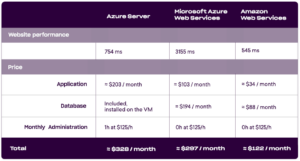
Microsoft Azure or Amazon Web Services: Which Platform Offers the Best Performance for Serverless WordPress?
At Logient, we are constantly striving to improve the efficiency of our platforms, which is why we wanted to test different types of WordPress hosting to measure their performance and achieve optimal results. Although our platform of choice is Azure and we have built a powerful infrastructure for our teams with this technology, we realized that the performance of WordPress applications in serverless mode sometimes left something to be desired, which prompted us to explore other avenues in the cloud.
As our team researched similar experiences with deploying WordPress on Microsoft Azure versus Amazon Web Services (AWS), comparative questions remained unanswered. We have therefore decided to share with you the results and conclusions of our numerous experiments and performance tests in order to determine which platform is the best for the implementation of a serverless WordPress.
Why WordPress? Since its launch in 2003, WordPress has carved out a niche as the most influential content management system (CMS) on the market, capturing according to W3techs 62% of the market. According to Netcraft, 1.3 billion websites exist to date, of which 35% (roughly 455 million) are on WordPress. It was therefore essential for us to improve our efficiency and compare different types of serverless hosting solutions.
Best Practices for Serverless WordPress, the Logient Experience
At Logient, we have 150 employees, 85% of whom work directly in software development. Our system administrator alone needs to know all the technologies required for this type of intervention, and support, which must be 24/7, becomes a complex task for a single resource. This is why we have opted for a serverless technology.
Our goal was to host a WordPress site on a platform without having to use a virtual machine which requires a system administrator for updates, security monitoring, maintenance, etc.
Serverless computing technologies, such as Azure and AWS platforms, eliminate the need to manage or update servers or operating systems. This is why we have made the choice to delegate the management of the infrastructure to a company that concentrates in doing so, reducing the required involvement of our resources, increasing the performance stability and speed of the WordPress site.
In addition to administration, using these serverless methods helps motivate our teams, as they learn and work with technologies that interest them and no systems administrator is required. Knowledge comes back to the teams; they can focus on development and deployment, their core business.
Is It Better to Use Azure or AWS for Serverless WordPress? Our Logient Opinion
First, we deployed WordPress in three different environments:
- Azure App Service + MySQL for Azure
- Azure App Service for containers + MySQL for Azure
- AWS Elastic Beanstalk + Aurora MySQL
What Are the Advantages of Serverless Technologies?
The platform as a service (PaaS) allows, among other things:
- automated deployment;
- managing the infrastructure by code;
- the use of a CDN and caching;
all without the need to:
- understand or install a virtual machine (VM);
- maintain the environment and its security;
since this service is offered directly by the supplier. Amazon Web Services and Microsoft Azure Web Services scale to the volume needed, do not require a dedicated team, and provide 95% comparable services.
Large companies will have the resources to implement IaaS (traditional hosting) infrastructures, but small companies will not have the capacity to do so, let alone the performance optimization. The implementation of load balancing exists, of course, with virtual machines, but they require system administrators, while with a serverless technology, it is enough to click and apply, making measures accessible like never before!
Is Using a Serverless Technology like Azure or AWS More Economical?
Officially, Azure or Amazon Web Services is no less expensive than using a virtual machine (VM), on the contrary. However, when human resources and maintenance costs are compared to the price of PaaS, they are confirmed to be superior to serverless technology.
According to the tests we have carried out, the results are conclusive! Never before documented, the effectiveness of this technique is evident even according to our results. Thus, for a significantly lower capacity than Microsoft Azure on Amazon Web Services, the performance was higher and the financial resources lower.
Comparison of WordPress Scenarios With or Without a Server
In the context of a basic infrastructure without the need for significant scaling up for a production environment, here are the comparative results of the different WordPress installation scenarios.
What Are the Main Differences Between Azure and AWS?
We found the Microsoft Azure interface (UX) to be much more user-friendly and easier to use in terms of user experience, so much so that we considered using it 100% before further testing. Amazon Web Services, even as a precursor, suffers from usability gaps despite the performance gains it offers.
Our conclusion after the tests? We opted for a development environment within Microsoft Azure App Service because of its interface, but to put the development into production, we chose to deploy it to Amazon Web Services for its performance. The advantage at the UX level is not proving to be sufficient to outweigh the performance and cost advantages.
As a company, we had to evaluate all the cloud services available to us in order to determine which one offers a better ROI for the technology used, keeping it when it works well for a technology, which allows teams to master it even if we can’t only limit ourselves to one.
We never initially envisioned such a great return on investment, with resource savings and a noticeable increase in performance. Although we have carried out such extensive testing only with WordPress, the possibility of opening up this type of solution to other technologies remains endless, for example in the case of custom–built APIs and web services.
We hope that these specific results tested and proven for over a year by our team will help you make the best decision for your company.
Need assistance from our team? Contact us!




















